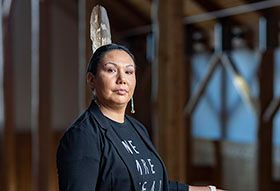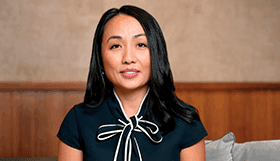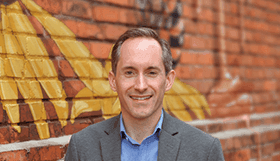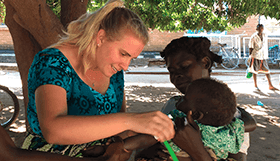UW Major: Marketing
Age: 38 | Washington, DC
Senior Congressional Correspondent, CNN
Washington Life Magazine named him to its annual list of DC’s young “power players.” India Abroad newspaper called him “King of the Hill.” But another moniker appears in Manu Raju’s Twitter profile: “Wisconsin Badger for life.”
“The University of Wisconsin is not just my alma mater,” he says. “It’s part of my identity.”
Raju is CNN’s senior congressional correspondent, known for his broadcast journalism about some of the nation’s most contentious political issues. With a talent for behind-the-scenes reporting and landing influential interviews, he’s been breaking news on Capitol Hill for 15 years.
Raju has reported for Inside Washington Publishers (a media group covering federal policy), Congressional Quarterly, and The Hill; and he was Politico’s senior Capitol Hill correspondent for seven years. He’s also often shared his insights with viewers of NBC, CBS, and PBS, where he was a regular guest for political talk shows.
“I learned that success is dependent on hard work — whether it’s in the workplace, classroom, or at home. And to succeed, you need to learn from your errors and persevere, even when things may be looking grim.”
After joining CNN in 2015, Raju took a leave for the birth of his twins, then hit the election-campaign trail. He led CNN’s on-the-road coverage of Senator Marco Rubio’s bid for the U.S. presidency, spent time writing about key Senate races, and returned to Capitol Hill to cover the final year of Barack Obama’s presidency and the transition to the Trump administration.
Raju got his start in journalism as a student writer for the Badger Herald, where his first assignment was covering Badger men’s hockey. He worked his way up to sports editor, and he later landed his first gig at Madison’s NBC15.
He says those Madison journalism experiences taught him how to focus and succeed when the heat is on. And those early lessons continue to pay off: Raju was part of a team that earned a 2012 White House Correspondents Association award for reporting under deadline pressure. In 2017, the Radio and Television Correspondents Association awarded him first prize for his congressional coverage.
“I learned that success is dependent on hard work — whether it’s in the workplace, classroom, or at home,” Raju says. “And to succeed, you need to learn from your errors and persevere, even when things may be looking grim.”
Q&A with Manu
What’s the best piece of advice you’ve ever received?
There’s no specific formula for achieving your goals.
After I graduated from the UW and moved to Washington, I started at a trade publication covering federal policy. It was my first experience covering Washington, and I started to love it. After getting that experience under my belt and as I tried to get a new job at a newspaper in Washington, I constantly was confronted by employers telling me I was doing it all wrong. They said I was too young, had to leave DC, work in a small town, then move to a mid-size market before even being considered by a major news outlet to cover Washington.
That didn’t feel right to me. So I continued to work hard at my current job, sharpen my reporting skills, and write better stories. Soon enough, my work started to get noticed. I worked my way through several Washington publications before ending up at CNN.
What I learned from this experience is that everyone has his or her own unique career path — and it’s important to trust yourself and your judgment. The best way to accomplish your goals is to remain focused, work hard, and to take advantage of opportunities that present themselves.
What is the one thing every UW student must do?
Spend your summers in Madison. I loved UW every time of year — especially the fall — but the summers had such a different vibe: a very relaxed atmosphere with people enjoying the outdoors, plus interesting classes during the day. And spending afternoons and evenings on the Terrace at the Memorial Union is pretty much as close to heaven as you’re going to get.
What advice would you offer to graduating seniors?
It’s OK to say, ‘I’m new, and I don’t know, can you explain this to me?’ That was what my first boss in Washington told me. And he was right. There is nothing wrong with pleading ignorance. You actually end up learning a lot more about something if you are honest and say you don’t know. People generally won’t hold it against you — but they may if you pretend like you know something but really don’t. You’re new at something only once, so take advantage of it.
What occupies your free time?
My two-year-old twins, who are tons of fun and full of energy and with whom I try to spend as much time with when I am not working.
What was your first job?
My first job out of college was working at NBC-15 in Madison, where I worked on the assignment desk and did everything from listening to police scanners to helping coordinate coverage with reporters in the field. My first job in Washington was reporting on environmental policy for a newsgroup called Inside Washington Publishers, my first education in reporting on the federal bureaucracy and politics.
What lasting memories do you have of UW–Madison?
- My freshman year in Ogg East – the old Ogg East that doesn’t exist anymore – was a wild experience and where I met some of my closest friends.
- Pulling long hours studying for exams at College Library.
- Fall Saturdays going to Badger football games.
- Rushing State Street when the Badgers went to the Final Four in 2000. Going to the Rose Bowl in 1999 and 2000.
- Writing for four years at the Badger Herald, my very first introduction into journalism. Covering the NCAA tournament for men’s basketball in Boise in 2001.
- Asking Barry Alvarez questions at press conferences.
- Working at WSUM freshman year and taking advantage of the media credentials to cover UW football games, including standing on the sidelines in Camp Randall when the Badgers clinched the Big Ten championship in 1998 against Penn State.
- Hanging out with friends at the terrace, with the sun setting while listening to live music.
- The walks along Lakeshore Path and Bascom Hill.
- Taking advantage of everything State Street has to offer.
Essay by Manu
There’s no way I would be where I am today had it not been for my Wisconsin experience. In 1998, I was a college freshman, eager to try something new. I wasn’t quite sure what I wanted to do with my life. But I was thrilled to be at a university with so much to offer and so many opportunities that would ultimately shape the foundation of my life.
I tried a whole bunch of extracurricular activities and signed up for classes to see what piqued my interest. Among them: writing for the college newspaper, even though I had done nothing quite like this before. So I called up The Badger Herald, and I asked if there was any possibility of working for the sports pages.
Dan Alter, the sports editor at the time, told me to meet him at the men’s hockey practice the next afternoon. He gave me some useful advice on what to write and suggested I interview some players and prepare to write a sidebar on the team’s new challenges. He even gave me a handy tip: always bring two pens wherever you go.
I really had no idea what was I doing. But through guidance and mentorship, I managed to write my first article. Over the next four years at the UW, I grew more involved with the paper. I traveled the country to cover football and basketball games. I asked coach Barry Alvarez questions at his post-game press conferences. And I eventually become sports editor.
It was a tremendous learning experience. I made mistakes — lots of them. But I learned from them and became better at my job. As I grew more involved with the paper, I did some journalism internships, including with NBC-15 in Madison.
By the time I graduated, I realized that this was what I wanted to do with my life: journalism.
But beyond the professional growth, I grew as a person, too. I developed lifelong friends over the years, whether it was in Ogg East or at Grainger Hall. I spent countless hours studying at the Union and Memorial Library. I had some of the best times with friends hanging out on the Terrace during the summers. There were unforgettable sporting events, like two Rose Bowls and a Final Four in men’s basketball.
And I developed a rigorous work ethic -— whether it was through classes or the Herald and extracurriculars — that remains at my core today. I learned that success is dependent on hard work — whether it’s in the workplace, classroom, or at home — and to succeed, you need to learn from your errors and persevere, even when things may be looking grim.
But perhaps most importantly, I learned about succeeding under pressure by staying focused at my tasks at hand, which is fundamental to my life today.
To me, the University of Wisconsin is not just my alma mater. It’s part of my identity.





